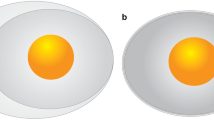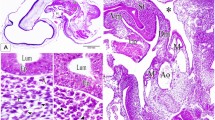Abstract
MILLER1 has described brown-shelled eggs with a characteristic taint produced in various parts of the United Kingdom during autumn 1971 and early 1972; this problem has occurred extensively in the UK over the same period in earlier years but it was much more apparent in 1971–1972.
This is a preview of subscription content, access via your institution
Access options
Subscribe to this journal
Receive 51 print issues and online access
$199.00 per year
only $3.90 per issue
Buy this article
- Purchase on Springer Link
- Instant access to full article PDF
Prices may be subject to local taxes which are calculated during checkout
Similar content being viewed by others
References
Miller, W. S., Ewins, A., and Chubb, L. G., Vet. Rec., 91, 632 (1972).
Vondell, J. H., Poult. Sci., 27, 244 (1948).
Keay, J. N., and Hardy, R., J. Sci. Fd. Agric., 23, 9 (1972).
Author information
Authors and Affiliations
Rights and permissions
About this article
Cite this article
HOBSON-FROHOCK, A., LAND, D., GRIFFITHS, N. et al. Egg Taints: Association with Trimethylamine. Nature 243, 304–305 (1973). https://doi.org/10.1038/243304a0
Received:
Issue Date:
DOI: https://doi.org/10.1038/243304a0
This article is cited by
-
Recognition and identification of compounds contributing to off-flavor of egg white powder by molecular sensory science approach
European Food Research and Technology (2023)
-
FMO3 deficiency of duck leads to decreased lipid deposition and increased antibacterial activity
Journal of Animal Science and Biotechnology (2022)
-
An overview of the phenolics of canola and rapeseed: Chemical, sensory and nutritional significance
Journal of the American Oil Chemists' Society (1992)
-
Rapeseed meal in animal nutrition: II. Nonruminant animals
Journal of the American Oil Chemists' Society (1981)
Comments
By submitting a comment you agree to abide by our Terms and Community Guidelines. If you find something abusive or that does not comply with our terms or guidelines please flag it as inappropriate.



